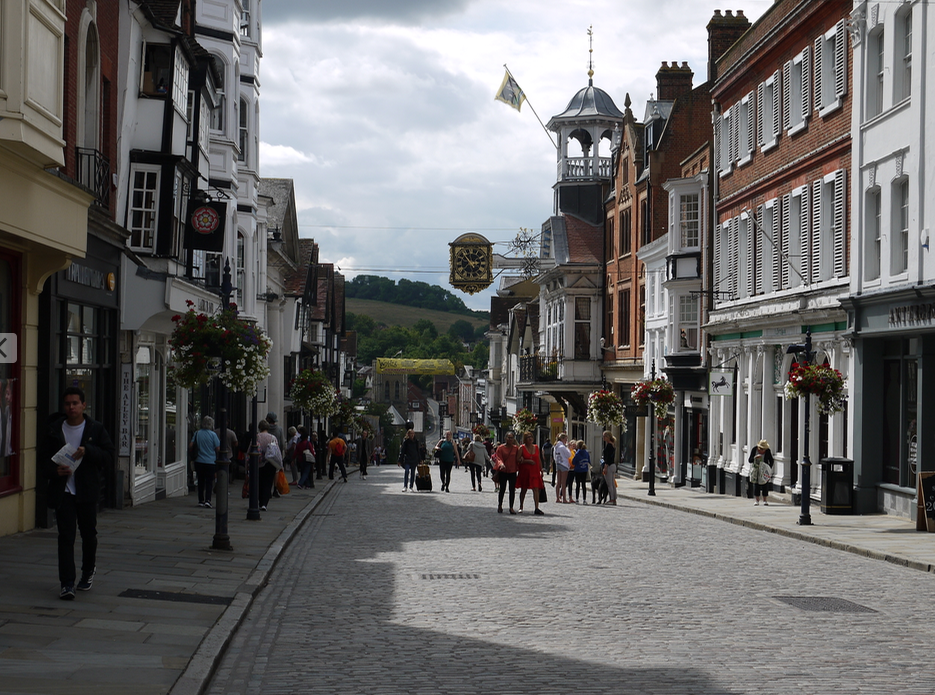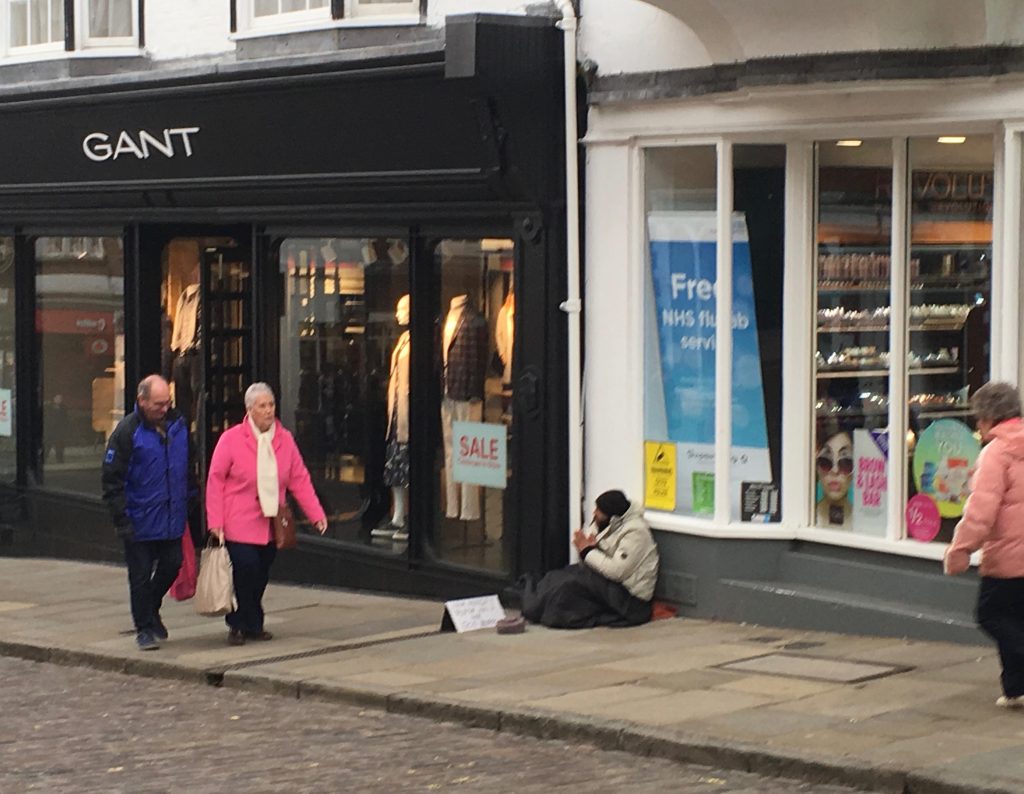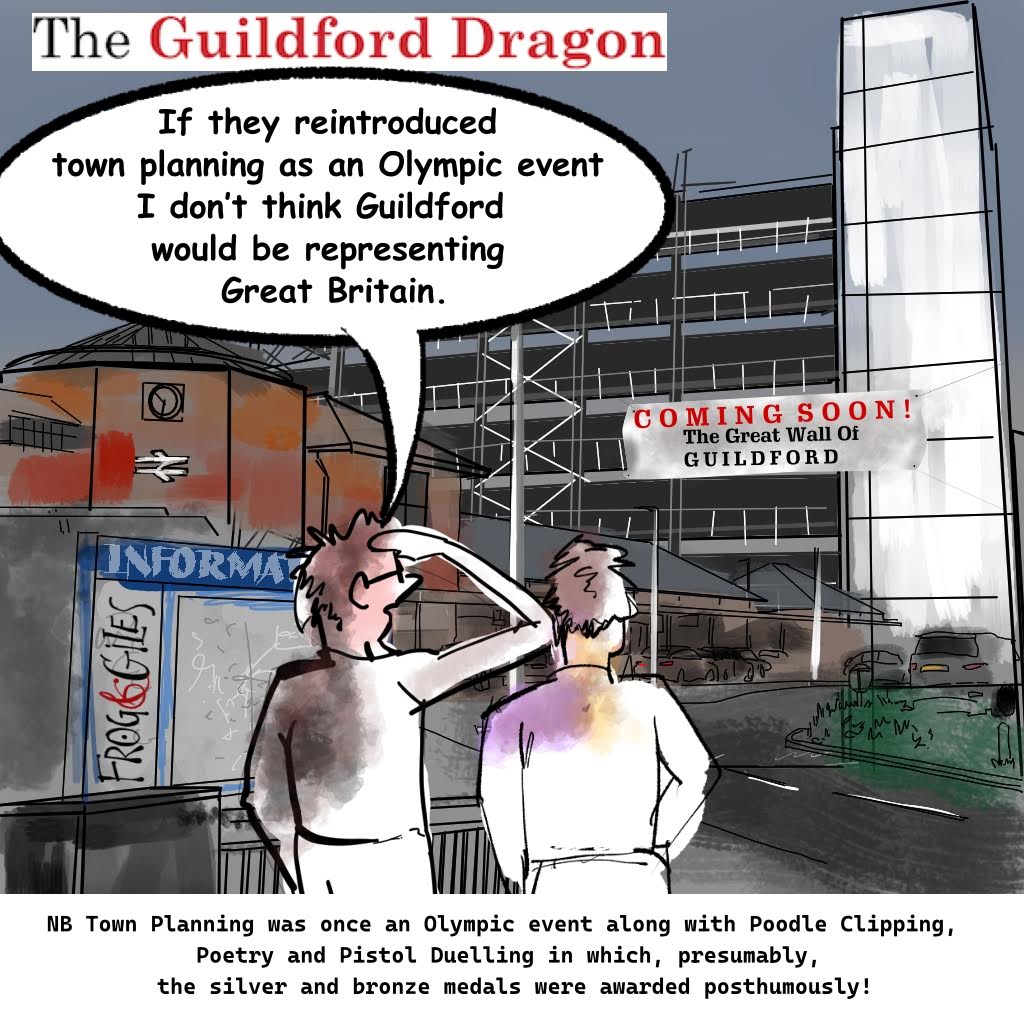 Abraham Lincoln
If given the truth, the people can be depended upon to meet any national crisis...
Abraham Lincoln
If given the truth, the people can be depended upon to meet any national crisis...
 Guildford news...
for Guildford people, brought to you by Guildford reporters - Guildford's own news service
Guildford news...
for Guildford people, brought to you by Guildford reporters - Guildford's own news service
The Harrowing Homeless of Guildford, a Visitor’s View
Published on: 27 Mar, 2019
Updated on: 30 Mar, 2019
 By Lala Cooper
By Lala Cooper
Lala Cooper has recently joined The Dragon’s editorial team and gives here an impression of our town she received as a visitor.
A few months ago, not long after I first moved to the area, I was walking up the High Street in Guildford, head down, earphones in, flicking through the “to do” list that had become a permanent fixture on my phone, dodging people by the sight of their feet coming towards me. I sighed.
Unscrewing the cap to my water bottle, I pulled my earphones out and took short, quick sips. And I heard live music.

Below the ancient carved oak braces of the town hall, sat a musician orchestrating a makeshift performance of what I can only assume was original material. His guitar was taped and strapped together, his mic and amp static stand as gravelly as his voice, and he was playing blues rock you hear only in ratchet clubs in America’s Deep South.
It was cold and blowy, and he was coated in scarves and blankets that had long ago seen their best days. His fingers navigated the strips of fabric lifting and falling with each gust of wind, his feet were shaking uncontrollably against the base of his stool. He was clearly homeless.
Perhaps it’s the backdrop of extreme wealth and elitism that makes poverty so stark in these towns…
When you spend enough time in heritage towns, the brick-by-brick cities that are simultaneously quiet and loud, Oxford, Bristol, Bath, you start to see a pattern. In Oxford, it seems that for every coffee house with free WiFi, filled with over-caffeinated, overworked 20-year olds, there are two people living on the streets.
Years ago, I was there during the summer exam season. The hot sun was shining and students in their gowns and white and red carnations were walking around in excited groups of eight, 10, 12.
I stopped outside a coffee house near St Giles and watched as a man in his late fifties tried to sell copies of The Big Issue. Less than 2 feet from him was a young student, white carnation, leaning against the same shop-front, cigarette in one hand and a bottle of open champagne in the other.
Perhaps it’s the backdrop of extreme wealth and elitism that makes poverty so stark in these towns; London still has the highest rate of homelessness in the UK, but it’s not as painfully obvious as when you see money and, well, not money side by side. The apparent correlation between homelessness and university towns is the elephant in the [lecture] room, and there is one loose in Guildford.
On my first Guildford visit, I walked from the train station to the top of the High Street, locking eyes with more men and women sitting against shop fronts than I can remember, and passed even more that I didn’t interact with than I care to admit. My response when someone asked me what my first impression of Guildford was: “It’s very beautiful. Great shopping.”

One apparently homeless individual on Guildford High Street.
It isn’t just what we see that counts. The stereotype that “being homeless” equates to living on the street is not only deeply damaging, but just wrong. In November last year, Shelter reported that an estimated 320,000 people in Britain have no home, sleeping rough, jumping from sofa to sofa, or existing in a hostel.
The laissez-faire mentality, we Brits have a bit of a habit of adopting, still plays into the stigma, stereotypes and misconceptions around homelessness. Many people who don’t have a permanent base will struggle with substance abuse, it often isn’t the root of their individual situation. Unemployment, family breakdown, unaffordable housing: there are many reasons why someone may lose their home.
But try to open the conversation, and you run the risk of pointed comments about whether or not giving change helps or hinders. And while we’re having arbitrary conversations about the chicken and egg of it all, one in three rough sleepers will be victims of violence or abuse.
…if you do one thing, make connection…
So that day, when the last chord struck, and this man’s voice held the final note a capella, applause burst out like thunder, and the crowd cheered. Rocking back on his stool, the musician smiled, then deflated. The crowd was dispersing, finishing their recording and putting their phones back in their pockets. “Aw, don’t leave now! Don’t leave me!” Equal parts playful and pitiful, desperate, slurred and distinct. He immediately began to play another song. A ballad. Slow, pensive, entirely void of that same bluesy energy that had pulled the crowd in the first place.
I stood and watched for a few moments until the man stopped playing altogether. He put the guitar down and took a long gulp of his drink. There was no blanket or hat in front of him, no guitar case or cardboard cup to accept money. Because he wasn’t asking for any. What he was asking for was recognition. Interaction. Compassion and connection. To speak or, in this case, sing and for someone to hear what he had to say. Simply, basic decency. What his audience had been looking for was entertainment.
We don’t all have to give the coat on our back and if you really don’t want to give the coins in your pocket, then don’t. Personally, I think it’s far better going towards a sandwich or can of beer than your vente cappuccino or vegan granola bar. But if you do one thing, make connection. Eye contact. A smile. Say hello. Think about what you would most want. Then do it.
Responses to The Harrowing Homeless of Guildford, a Visitor’s View
Leave a Comment Cancel replyPlease see our comments policy. All comments are moderated and may take time to appear.
Recent Articles
- Plans to Rebuild Frimley Park Hospital Get the Go-ahead
- Letter: Borough Council Recognises the Concerns About Building Heights
- Dragon Interview: Philip Brooker Conservative Leader at GBC
- City Impress to Win and Progress to Next Round of the FA Vase
- Refurbishment Work Continues at the Yvonne Arnaud While Theatre Re-opens
- Highways Bulletin for September 23
- SEND Child Misses Two Years of Education
- Letter: Will E-Bike Prices Put People Off?
- Correction: Warrant Was Issued for Arrest of HRA Investigation Suspect
- Guildford Lions Club Announces 2024 Firework Fiesta


Recent Comments
- Brian Holt on City Impress to Win and Progress to Next Round of the FA Vase
- Olly Azad on City Impress to Win and Progress to Next Round of the FA Vase
- Mark Percival on Letter: Will E-Bike Prices Put People Off?
- Jim Allen on Letter: Will E-Bike Prices Put People Off?
- Harry Eve on Strip Cartoon Tells Story of Monmouth Rebellion and its Guildford Links
- John Lomas on Letter: Will E-Bike Prices Put People Off?
Search in Site
Media Gallery
Dragon Interview: Local Artist Leaves Her Mark At One of England’s Most Historic Buildings
January 21, 2023 / No Comment / Read MoreDragon Interview: Lib Dem Planning Chair: ‘Current Policy Doesn’t Work for Local People’
January 19, 2023 / No Comment / Read MoreA3 Tunnel in Guildford ‘Necessary’ for New Homes, Says Guildford’s MP
January 10, 2023 / No Comment / Read More‘Madness’ for London Road Scheme to Go Ahead Against ‘Huge Opposition’, Says SCC Leader
January 6, 2023 / No Comment / Read MoreCouncillor’s Son Starts Campaign for More Consultation on North Street Plan
December 30, 2022 / No Comment / Read MoreCounty Council Climbs Down Over London Road Works – Further ‘Engagement’ Period Announced
December 14, 2022 / No Comment / Read MoreDragon Interview: GBC Reaction to the Government’s Expected Decision to Relax Housing Targets
December 7, 2022 / No Comment / Read MoreHow Can Our Town Centre Businesses Recover? Watch the Shop Front Debate
May 18, 2020 / No Comment / Read More










Stephen Mansbridge
March 27, 2019 at 12:45 pm
I think this is a very moving and accurate portrayal of a growing problem in Guildford.